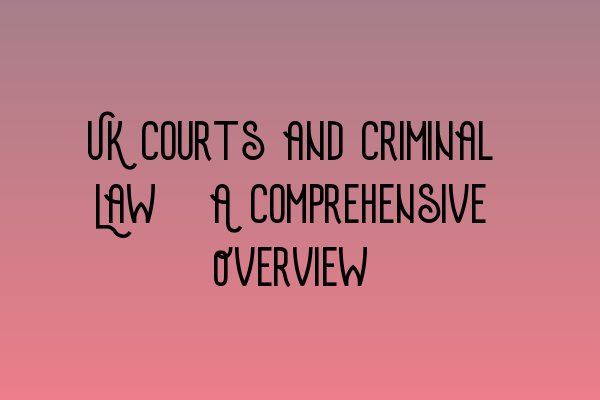UK Courts and Criminal Law: A Comprehensive Overview
Welcome to our comprehensive overview of the UK courts and criminal law. In this blog post, we will delve into the intricacies of the UK legal system, explore the different courts involved in criminal cases, and provide an in-depth understanding of how criminal law works in the UK.
The UK Legal System
Before we discuss the courts and criminal law, let’s take a moment to understand the UK legal system as a whole. The UK legal system is based on common law, with legislation playing a significant role in shaping the law.
In the UK, both civil and criminal cases are heard by different courts, each with its own jurisdiction and powers. The UK legal system has a hierarchical structure, with different courts having different levels of authority and responsibility. Understanding this structure is crucial to navigating the legal landscape effectively.
The Courts in the UK Criminal Justice System
The UK criminal justice system consists of several courts, each playing a specific role in the process of administering justice. These courts can be categorized into three main levels:
- The Magistrates’ Court: The Magistrates’ Court is the lowest level of court in the UK criminal justice system. It deals with less serious criminal offenses, such as minor assaults, theft, and motoring offenses. Cases in the Magistrates’ Court are generally heard by a panel of three magistrates or a district judge.
- The Crown Court: The Crown Court is the middle level of court in the UK criminal justice system. It handles more serious criminal cases, such as murder, rape, and drug offenses. Trials in the Crown Court are presided over by a judge and a jury. The Crown Court also has the power to review and hear appeals from the Magistrates’ Court.
- The Supreme Court: The Supreme Court is the highest level of court in the UK. It primarily handles appeals from lower courts, including the Crown Court. The Supreme Court comprises justices who make decisions on matters of legal importance and constitutional significance.
Each court within the UK criminal justice system plays a vital role in ensuring that justice is served, and understanding their functions is essential for both legal professionals and individuals involved in criminal cases.
The Role of Criminal Law in the UK
Criminal law in the UK is a complex and fascinating area of study. It encompasses a wide range of offenses, from minor misdemeanors to serious felonies. The primary goal of criminal law is to maintain public order, protect society, and punish those who have committed crimes.
When a criminal offense is committed, the Crown Prosecution Service (CPS) is responsible for determining whether there is enough evidence to bring a case to court. The CPS works closely with law enforcement agencies, such as the police, to gather evidence and ensure a fair and just legal process is followed.
Once a case reaches court, the burden of proof lies with the prosecution. They must prove beyond a reasonable doubt that the accused is guilty of the crime they have been charged with. If the accused is found guilty, the court determines the appropriate sentence based on the severity of the offense and relevant legal guidelines.
For those interested in pursuing a career in criminal law, it is essential to have a solid understanding of both substantive and procedural criminal law. Substantive criminal law defines the offenses and their respective penalties, while procedural criminal law governs the processes and rules followed in criminal cases.
Conclusion
In conclusion, the UK courts and criminal law are integral components of the UK legal system. Understanding the structure and functions of the courts, as well as the principles of criminal law, is essential for anyone involved in or interested in criminal justice.
If you’re preparing for the SQE exams, we also offer an array of helpful resources and courses to assist you in your preparation. Check out our related articles on SQE 1 practice exam questions, SQE 1 practice mocks FLK1 FLK2, SQE 2 preparation courses, SQE 1 preparation courses, and SRA SQE exam dates.
Stay tuned to our blog for more informative posts on various aspects of law, and feel free to reach out to us if you have any legal queries or require professional legal assistance.
